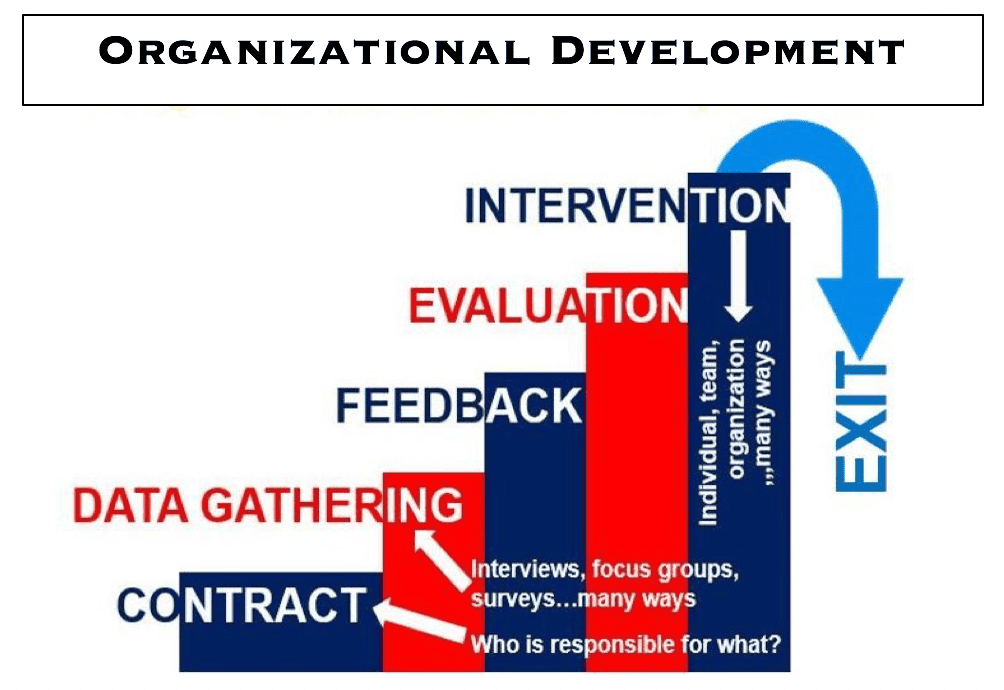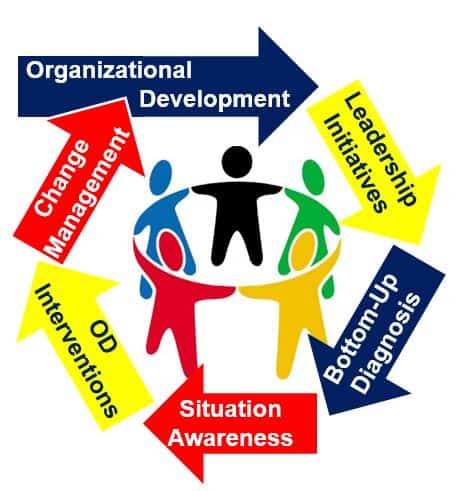Organizational Development, also known as OD, has a number of meanings. It may refer to a planned and systematic approach to improving the effectiveness of a company, government department, or any organization – one that aligns strategy, individuals and processes. It includes the practice of planned, systematic change in the values, attitudes, and beliefs of a company’s employees through the creation and reinforcement of medium- or long-term training programs.
A growing field of Human Resource Management, organizational development is the study of successful organizational performance and change. The subject emerged in the 1930s from human relations studies, during which psychologists became aware that organizational structures and processes influence the motivation and behavior of the workforce.
OD today also encompasses the aligning of organizations with their complex and rapidly changing environments through organizational learning, knowledge management, and adapting organizational values and norms.

Organizational development: an ongoing process
Organizational development is an ongoing process of implementing effective change in how an organization operates.
It is known as both a field of scientific study and inquiry and a field of science that focuses on understanding and managing the systematic changes of organizations.
The Australian Human Resources Institute (AHRI) says the following regarding Organizational Development and its definition:
“Whilst there is no single definition of organizational development (OD), it is commonly known to be the practice of changing people and organizations for positive growth.”

AHRI lists the following as typical OD activities:
- – career development
- – change management
- – coaching
- – e-learning
- – innovation
- – leadership development
- – organizational assessments
- – talent management
- – team building
- – training
Key concepts of Organizational Development theory include:
– Organizational Culture: deeply-seated values, norms and behaviors that employees or members have.
– Organizational Strategies: how a company or any organization identifies issues, puts plans into actions, negotiates changes, and assesses progress.
– Organization Climate: an organization’s unique ‘personality’ or mood, which includes the beliefs and attitudes that influence the collective behavior of the workforce or members.
Organizational development means taking action
Organizational development is action-oriented. It starts with a careful analysis of the whole organization, focusing on its current situation and future requirements, and then employs behavioral science techniques including transactional analysis, sensitivity training and behavior modelling.
The aim is to help the organization adapt more successfully to the rapidly-changing, complex environment of the marketplace with all its new regulations, rivals, fast-changing consumer preferences and lifestyles, and technologies.
Benefits of Organizational Development
It empowers leaders and employees, and creates a culture of ongoing improvement and alignment around common goals.
The integration of interdepartmental communication within OD programs has been shown to significantly enhance collaborative efforts and overall organizational efficacy.
OD makes it possible for organizations to change and adapt more easily and quickly. Which in today’s marketplace is not only an advantage – it is a basic requirement for survival.
Organizational development strategies now increasingly incorporate data analytics to inform decision-making processes and operational adjustments.
Apart from giving the workforce something to focus on – putting them to work – it improves the quality and speed of decisions.
With organizational development, conflicts become constructive rather than destructive. It gives the leaders of commercial enterprises more control over results, by providing the workforce with more control over how it does its job.
Outcomes from Organizational Development
Companies are better able to either make a profit or boost their profits for many reasons, including cost effectiveness, a better understanding of consumer preferences, and adopting more productive working methods.
There tends to be more innovation, better products and quality of services, and considerably greater customer satisfaction.
Employees, their supervisors and upper management enjoy a better work environment, and in most cases a healthier work-personal life balance.
The organization becomes better able to adapt to a rapidly-changing market. The adaptations and changes are ongoing because the marketplace never stays the same for long.
What is an organization? An organization is an organized group of people who work together – they have a common goal.
Video – What is organizational development?
This video presentation, from our sister channel on YouTube – Marketing Business Network, explains what the meaning of ‘Organizational Development’ is using simple and easy-to-understand language and examples.
